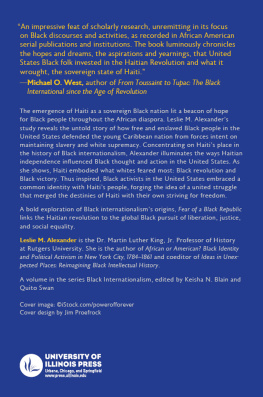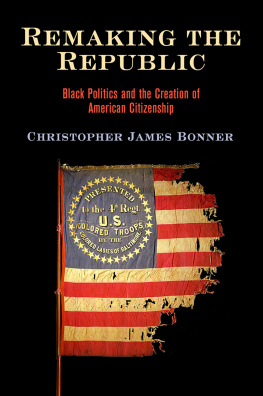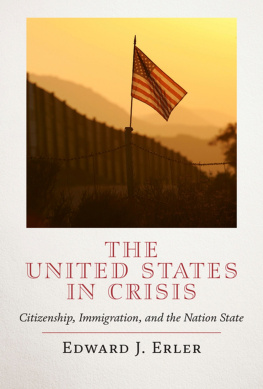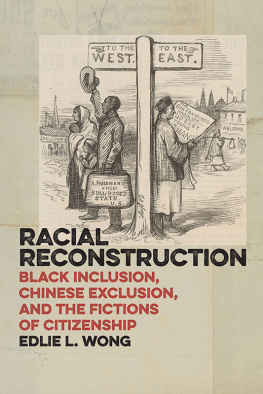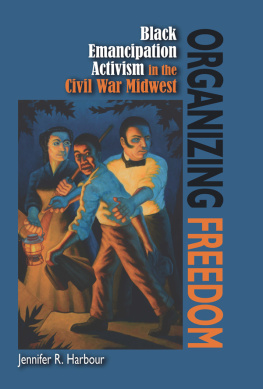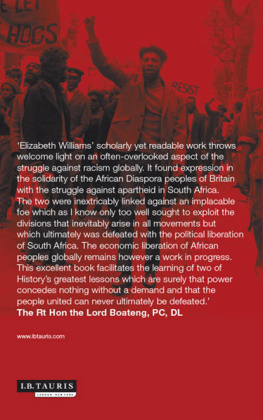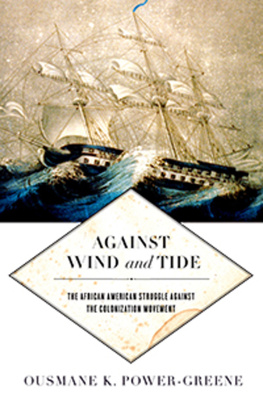Race and Nation in the Age of Emancipations
Race in the Atlantic World, 17001900
SERIES EDITORS
Richard S. Newman, Rochester Institute of Technology
Patrick Rael, Bowdoin College
Manisha Sinha, University of Massachusetts, Amherst
ADVISORY BOARD
Edward Baptist, Cornell University
Christopher Brown, Columbia University
Vincent Carretta, University of Maryland
Laurent Dubois, Duke University
Erica Armstrong Dunbar, University of Delaware and the Library Company of Philadelphia
Douglas Egerton, LeMoyne College
Leslie Harris, Emory University
Joanne Pope Melish, University of Kentucky
Sue Peabody, Washington State University, Vancouver
Erik Seeman, State University of New York, Buffalo
John Stauffer, Harvard University
Race and Nation in the Age of Emancipations
EDITED BY
Whitney Nell Stewart
John Garrison Marks
The University of Georgia Press
ATHENS
2018 by the University of Georgia Press
Athens, Georgia 30602
www.ugapress.org
All rights reserved
Designed by Kaelin Chappell Broaddus
Set in 11/13.5 Fournier MT Std by
Graphic Composition, Inc.
Bogart, Georgia
Most University of Georgia Press titles are available from popular e-book vendors.
Printed digitally
Library of Congress Cataloging-in-Publication Data
Names: Stewart, Whitney Nell, editor. | Marks, John Garrison, editor.
Title: Race and nation in the age of emancipations / edited by Whitney Nell Stewart, John Garrison Marks.
Description: Athens, Georgia : University of Georgia Press, 2018. | Series: Race in the Atlantic world, 17001900 | Includes bibliographical references.
Identifiers: LCCN 2017047637| ISBN 9780820353104 (hbk : alk. paper) | ISBN 9780820353111 (pbk : alk. paper) | ISBN 9780820353098 (ebook)
Subjects: LCSH: LibertyHistory. | FreedomHistory. | CitizenshipHistory.
Classification: LCC JC596 .R33 2018 | DDC 323.1196/01821dc23 LC record available at https://lccn.loc.gov/2017047637
CONTENTS

JULIE SAVILLE
WHITNEY NELL STEWART AND JOHN GARRISON MARKS
MATTHEW SPOONER
ANDREW N. WEGMANN
IKUKO ASAKA
PHILIP KAISARY
MARTHA S. JONES
GAD HEUMAN
CAREE A. BANTON
PAUL J. POLGAR
JAMES E. SANDERS
CELSO THOMAS CASTILHO
FOREWORD

Nations beyond Nations
JULIE SAVILLE
Dy mn gen mn.
Beyond mountains there are yet more mountains.
HAITIAN PROVERB
During its increased recognition and ongoing incorporation as an established field of academic inquiry, the framework of the Atlantic world has inspired a rich and burgeoning body of scholarship. Like other productive areas of academic inquiry, the Atlantic world, as a historically varying domain of shifting human experiences, encompasses a range of conceptual approaches, methodologies, and thematic problems. Just a few of its organizing themes are state-to-state diplomatic relationships; webs of long-distance trade, commerce, and consumption; the origins and consequences of Western Europes imperial colonizations of the Americas; and the politics of diasporic migrations and returns. Although the logics of these central themes conceive the problematics that Atlantic studies should address somewhat differently, all of them make clear that the early modern and modern Atlantic world differed in many respects from the Mediterranean world as examined by Fernand Braudel. The social, economic, and cultural contours of the Atlantic world are distinguished from the sixteenth-century Mediterranean by the formers volatile, often violent colonial encounters, unprecedented penetration of dispersed social organizations by capitalist economic development, transportation of forced labor to far-distant sites to produce key commodities that were processed and consumed elsewhere, and invention and broad dispersal of logics of racial identification.
Much of the work in this expansive fieldparticularly the scholarship inspired by the explorations of slavery, race, and colonialism opened by W. E. B. Du Bois, C. L. R. James, and Eric Williamshas explored and debated the development, transformations, and consequences of Atlantic slavery and the slave trade. Reflecting on this current emphasis, historians Whitney Nell Stewart and John Garrison Marks have shaped this volume to bring into view the research agendas that can be enriched by extending investigations to encompass Atlantic slaverys abolitions over the course of the long nineteenth century. An analytical shift that draws slave emancipations more fully into Atlantic studies frameworks recuperates Du Boiss, Jamess, and Williamss interest in the long-term global effects of slavery, race, and colonization in generating contradictions of modern freedom. This approach is also well suited to capture changes in the historical meanings of nation and citizenship as the abolition of slavery increasingly defined the path to political independence that the new nations in North and South Americathough not the slaveholding colonies of the Caribbeanwould take.
The circumstances of formerly enslaved, freeborn, and manumitted people of color in the nations that emerged during more than a century of slave emancipations seemed emblematic of the modern meaning of nation that French scholar Ernest Renan described in his well-known essay What Is a Nation? (first delivered as an 1882 lecture at the Sorbonne).postemancipation tensions of nineteenth-century nationhood that often lent a transregional character to the pursuit of emancipation from slavery.
Explorations of the Atlantic dimensions and consequences of slave emancipations promise to deepen understanding of the practical and symbolic meanings of nationhooda project launched by Benedict Andersons widely influential Imagined Communities. Around the Atlantic, previously subordinated social groups seized abolition of the slave trade, reports (sometimes misapprehended) of court decisions concerning slavery, accounts of the activities of antislavery groups (also at times misconstrued), and even rumored decrees of government officials (usually exaggerated) as institutional guarantees foretelling the fulfillment of aspirations long subordinated under the weight of slaverys racial hierarchies. The social order envisioned by members of these groupspart prophecy, part experienceamplify Andersons pioneering insistence on nations as imagined communities, grounded in historically specific cultural practices and modes of social communication rather than the fixed, stable prerequisites whose decline Renan had posited.
The essays in this volume give close attention to the particular geographic, cultural, and historical contexts in which formerly enslaved people and freeborn people of color began to express an abstract sense of peoplehood whose importance to nation making Anderson has identified. In some respects, they began to forge national sentiments from peculiaror at least unconventionalcommunity identities. Widely dispersed groups of people, few of whom were mutually acquainted, shared visions of freedom more than territorial loyalties, an attachment to liberty more than to patriotism or, indeed, at times, to life, and more of an opposition to direct domination than an affinity for particular governments. In contrast to propertied, often literate enclaves among free people of color, who appealed to imperial and metropolitan statutes to bolster their claims for civic standing, enslaved people drew on a broadly common ethos that expressed itself most fully in the plane of action rather than as legal precedent or philosophy. Enslaved men, women, and children variously made their ways in mass escapes toward third partiesBritish, American, Spanish, French, or, in later contexts, Yankee, Mexican, or Brazilian armies and territories.
Next page

